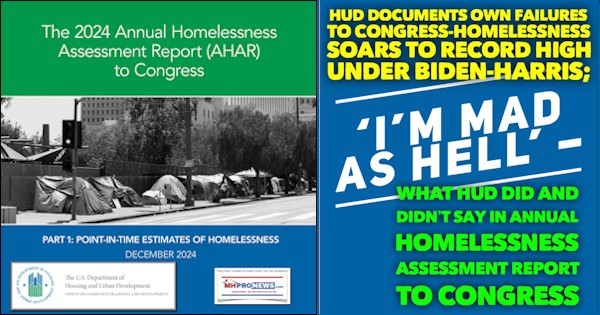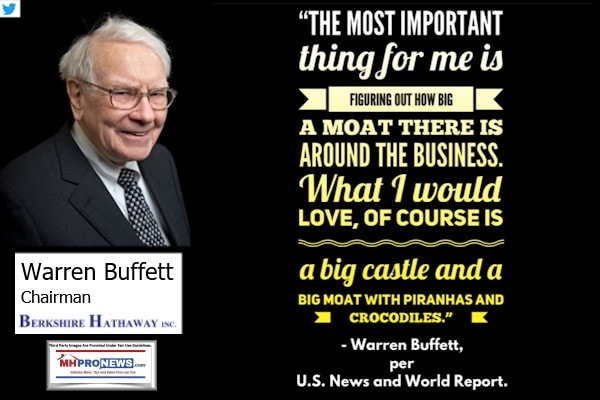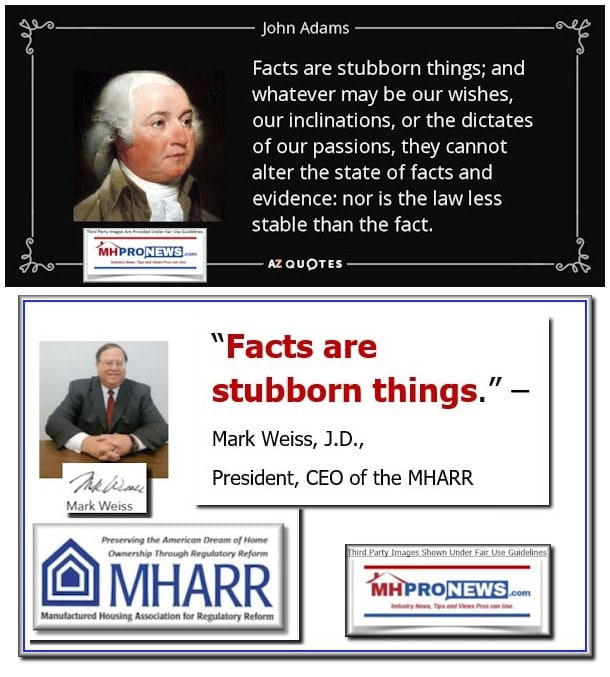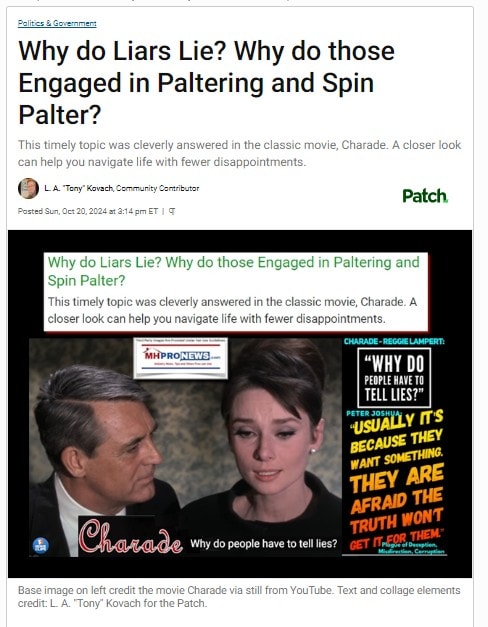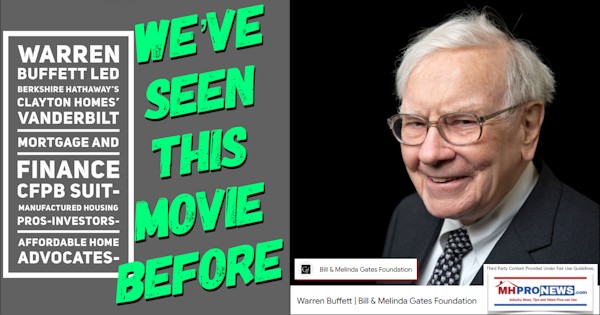
Manufactured housing professionals have likely seen one or more of the headlines (see below) and may have heard the buzz about the latest Consumer Financial Protection Bureau (CFPB) enforcement action taken on January 6, 2025 against Clayton Homes’s captive lender, Vanderbilt Mortgage and Finance (VMF). But what thousands of professionals may or may not have seen or considered are the Paul Harvey-esque stories behind the story. Vanderbilt apparently knew this was coming, which means that Clayton Homes knew it was coming. Warren Buffett himself may have known this was coming at Berkshire Hathaway’s office in Omaha, Nebraska. Berkshire Hathaway (BRK) owns Clayton Homes, Vanderbilt Mortgage and Finance (VMF), 21st Mortgage Corporation outright. If Berkshire-backed brands knew, it is possible that they advised the Manufactured Housing Institute (MHI). But even if Clayton clan kept MHI in the dark, what is apparent from the home page and news landing pages of the MHI website is this. As of the date/time shown here, MHI has yet to publicly respond on behalf of the manufactured home industry. Clayton Homes has issued a press release on their site. But what this facts-evidence-analysis (FEA) and expert commentary will demonstrate in Part I is that this might as well be a rerun of the left-leaning Seattle Times “Mobile Home Trap” series, left-leaning PBS’ Bad Bargain, or Last Week Tonight with John Oliver’s Mobile Home on HBO all over again. It is similar to the way that MHI’s Preserving Access to Manufactured Housing Act failed legislative battle began. This ought to be a lesson from history for any professional interested in why manufactured housing is struggling during an affordable housing crisis. But Warren Buffett himself has said per left-leaning Time, GuruFocus, left-leaning MSN (see below in Part I), and an array of other sources that have quoted the Oracle of Omaha saying: “What we learn from history is that people don’t learn from history.”
In Part II, this time, affordable housing and manufactured home advocates should say, enough is enough. This time, the lessons from a decade or less ago ought to be clearly brought into focus and addressed with the incoming Trump Administration and the appropriate public officials in every state in the U.S.
Part I
1) From the Consumer Financial Protection Bureau (CFPB) is the following screen capture (see “most complete” and detailed report linked here).
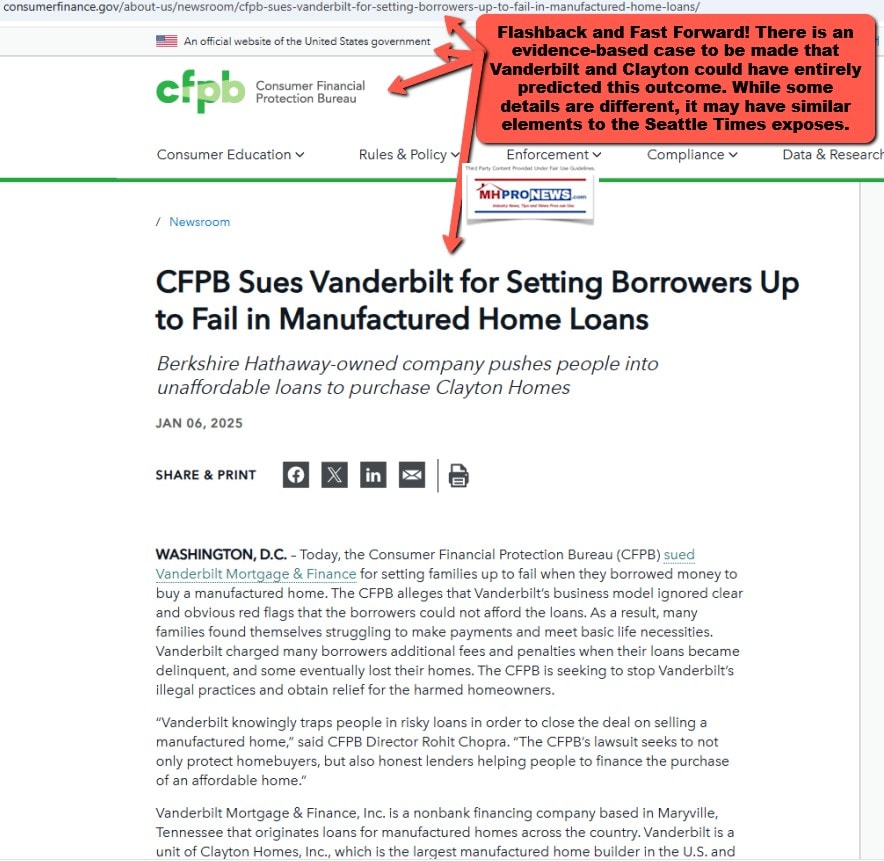
First, above and further below let’s see what the current news headlines say.
2) Then, a look back with the appropriate analysis and commentary can bring into focus the points raised in the preface above.
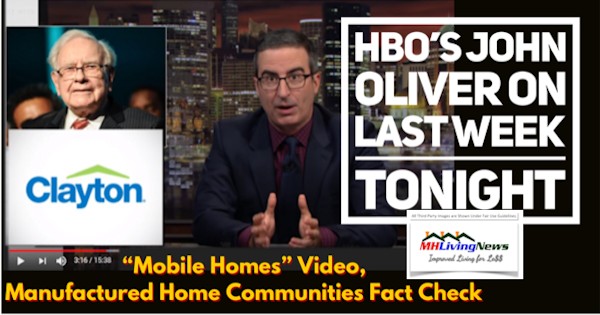
3) Because for Clayton and the so-called Big Three producers at MHI, this most recent black eye for manufactured housing may become a blessing in disguise.
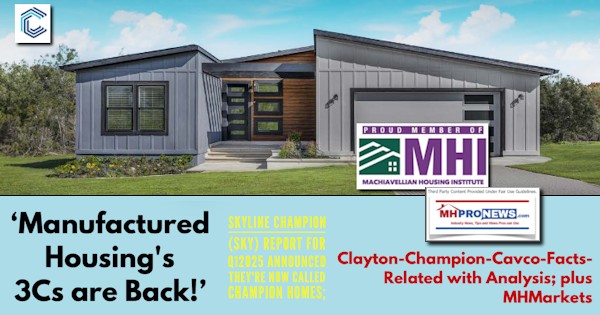
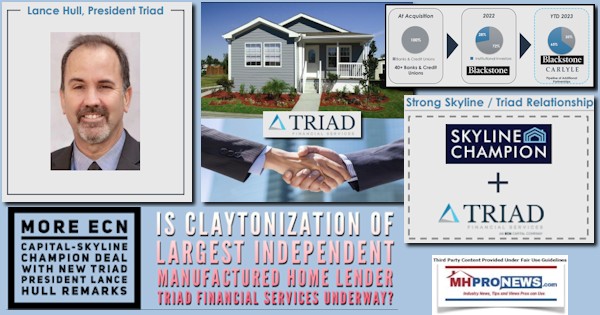
4) For others in manufactured housing, this CFPB legal action may be a slam for them – even if it doesn’t involve them at all. This media blow may for some business leaders be the final nail that drives some retailer(s), some independent producer(s) or others involved in manufactured housing to decide to exit. This may be the latest example of sly sabotaging monopoly tactics with a federal regulator acting as the hit man. It doesn’t even require that the CFPB knows whether or not they are ‘the hit man,’ because the outcome could be the same.
5) Berkshire Hathaway (BRK) owned Clayton Homes can financially handle this onslaught of apparently mostly negative news. Per this Google News search reflected in the screen captures below, there are about 10 or more pages of news articles that the more recent reports are apparently mostly about the latest CFPB legal against vs. Clayton’s Vanderbilt lending unit.
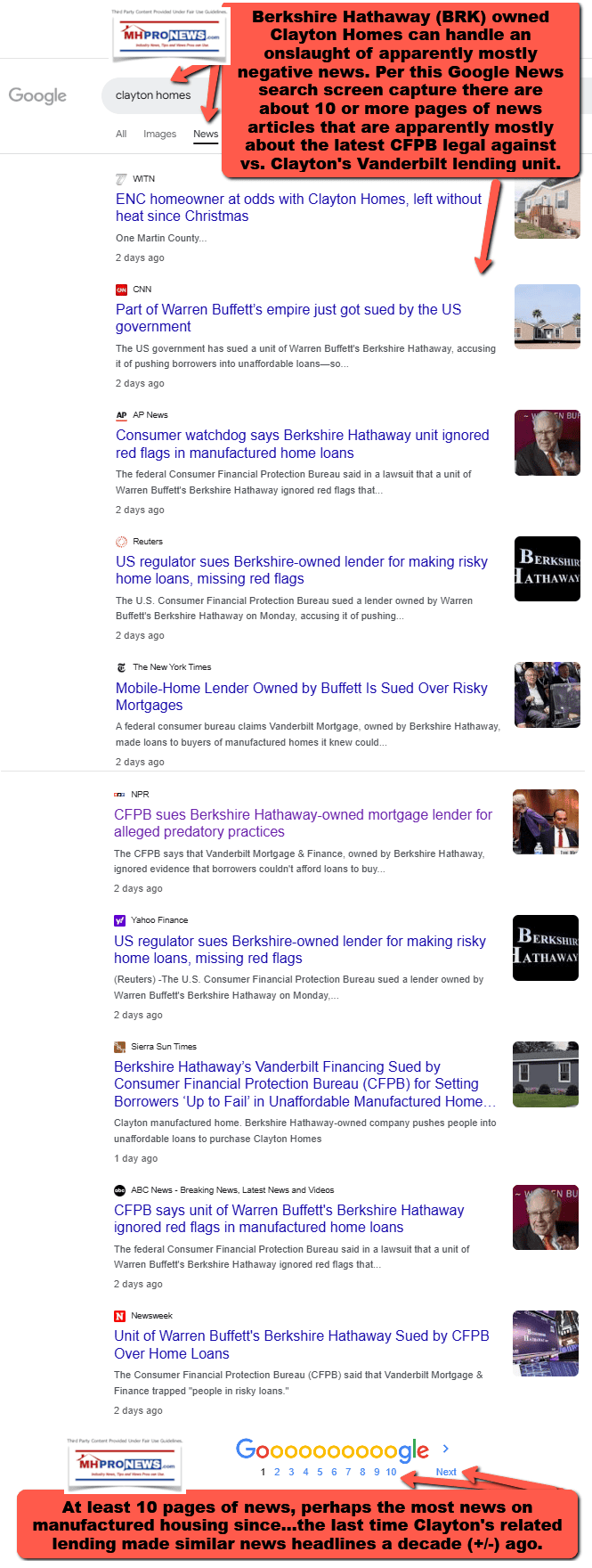
6) At least 10 pages of news for that specific search term shown above or below has generated perhaps the most news on manufactured housing since…the last time Clayton’s related lending made similar news headlines a decade (+/-) ago. Because of Clayton Homes’ size the last dust-up hurt that began circa 2015 hurt the industry at large. So, it could hurt the manufactured home industry again. MHI was demonstrably limp. MHI is beginning MIA once more.

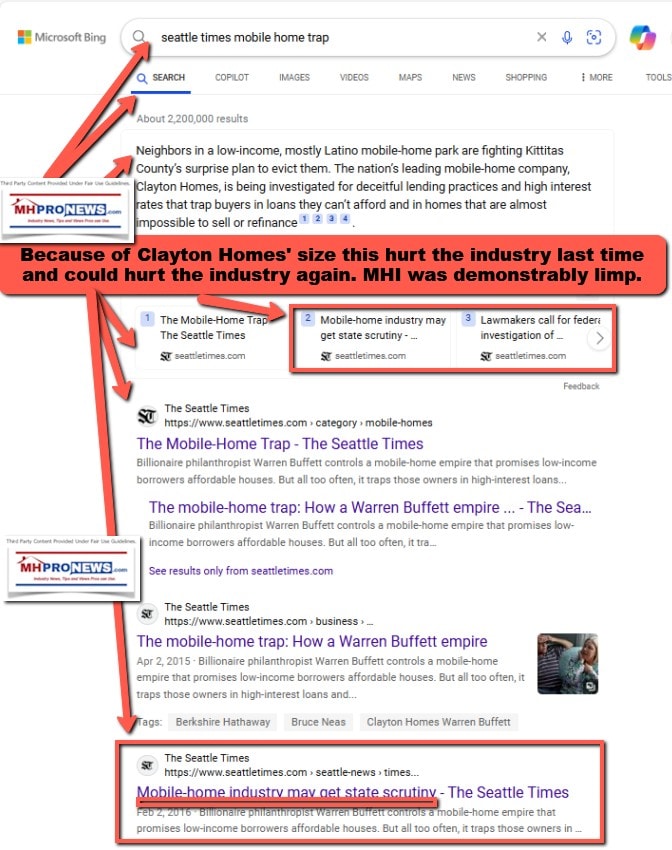

7) People may learn the truth from a variety of sources, experience, reflection, and historic patterns. But such learning only occurs when individuals are paying close enough attention, which is why Buffett’s history quote is relevant: “What we learn from history is that people don’t learn from history…” – Warren Buffett. Some do pay close attention, but for millions, this is likely not of immediate concern to them.
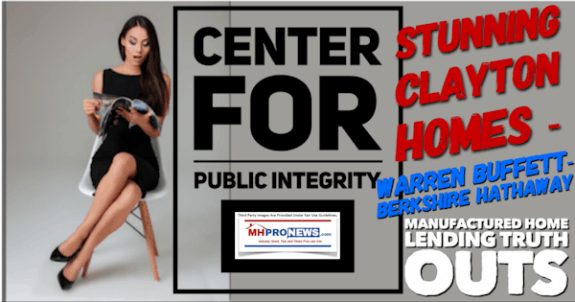
8) On this date, some 60 percent of the news headlines found under a “manufactured homes” search are about the CFPB legal action against Warren Buffett led Berkshire Hathaway owned Clayton Homes and their Vanderbilt Mortgage and Finance (VMF) captive lending unit. Kevin Clayton, CEO of Clayton Homes, might think he and his cronies will be laughing all the way to the bank. It will be interesting to watch the new manufactured home production data in the wake of this latest episode. This report may also be a reason for public officials and plaintiffs’ attorneys to research the relationship between industry consolidation and underperformance during a period of population growth coupled with a well-documented affordable housing crisis.
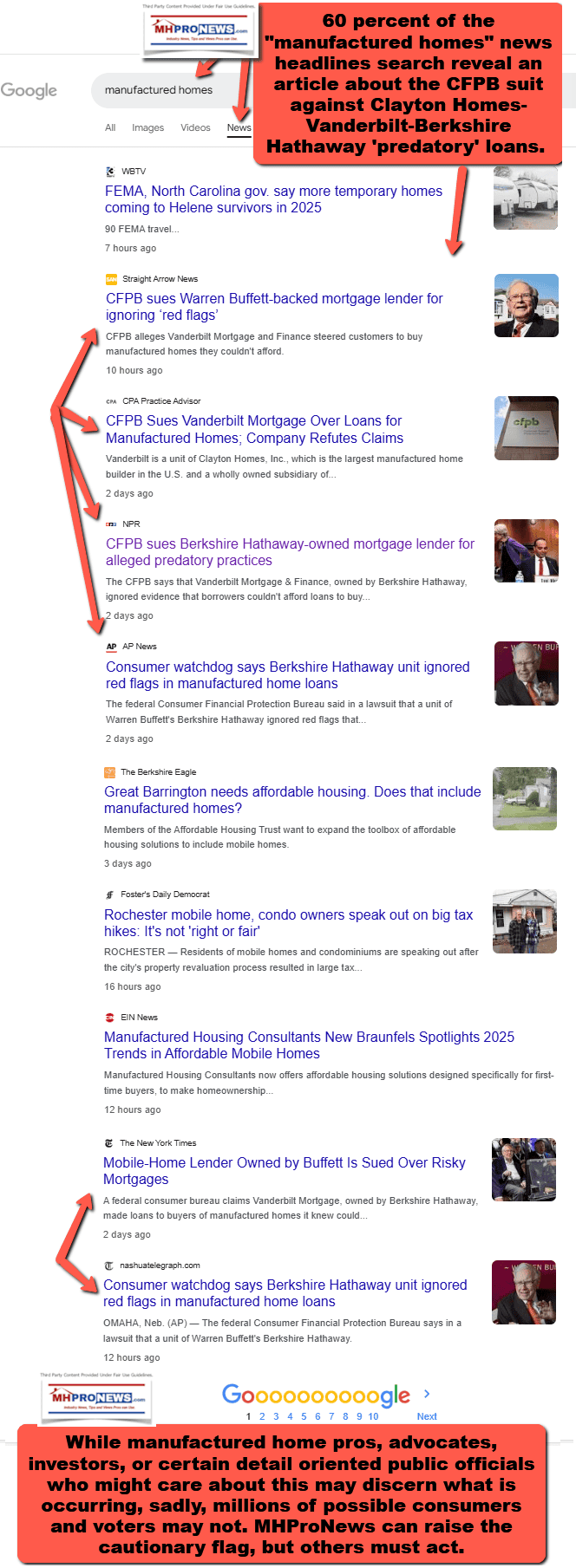
9) MHProNews has indicated off and on for perhaps a decade via reports and commentaries that manufactured housing needs a new post-production trade group. It has become increasingly evident that such a trade group should create a bright line separation between their members and that of other Manufactured Housing Institute (MHI) affiliated firms, who seem to have dominating members that periodically stir up negative news headlines.
Warren [Buffett] is very competitive…he paints such an image in each of our manager’s minds about this moat, this competitive moat, and our jobs is very simple and we share this…
Deep and widen your moat to keep out the competition…
But some of our competitors do a good job, but our plans are to make that difficult for them.”
— Kevin Clayton, President and CEO of Clayton Homes, a Berkshire Hathaway (BRK) owned brand. From video and transcripts posted on MHLivingNews and MHProNews.
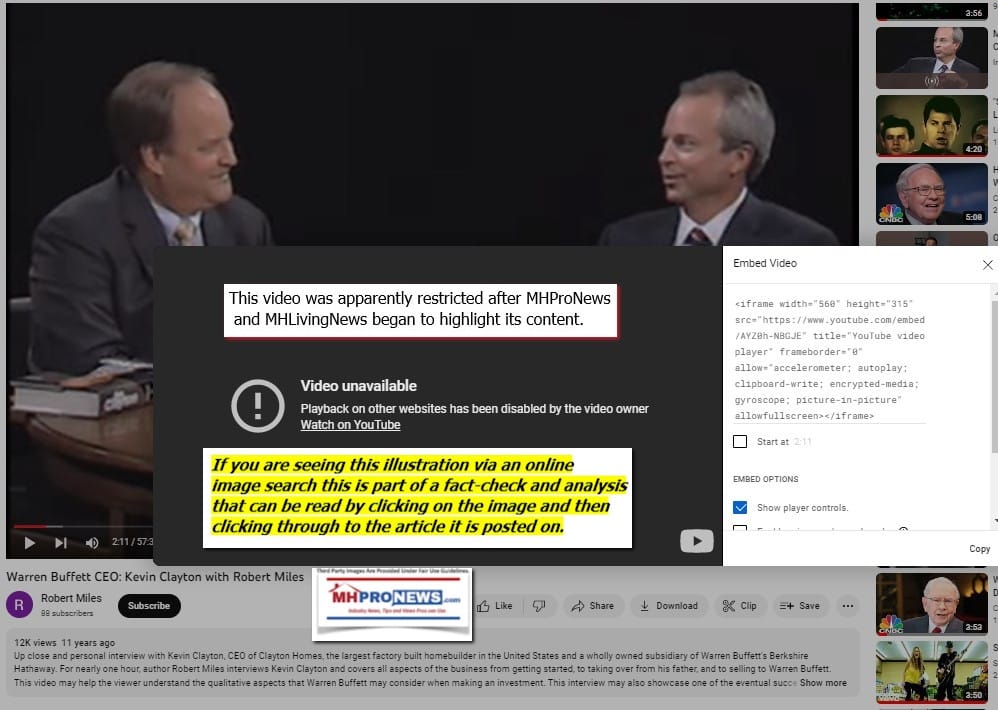
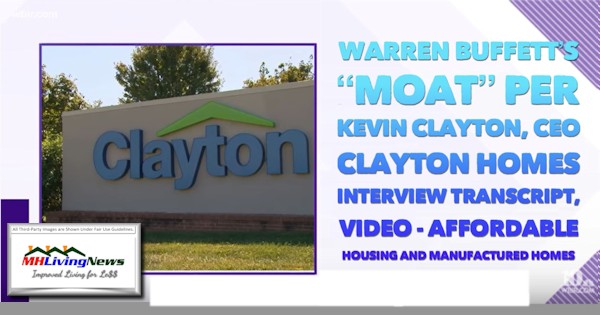
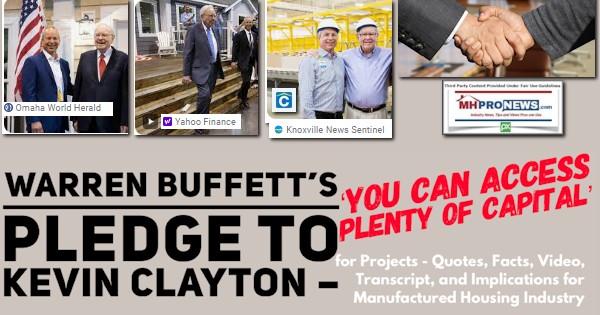
10) Why is it that others in manufactured housing news and views (i.e.: trade media and bloggers) have failed to share that same video and transcript? Particularly those who are in the Manufactured Housing Institute (MHI) orbit? Could it be that they are more interested in being in the good graces of Clayton, 21st, Vanderbilt, MHI, and their state association affiliates?
11) Buffett led Berkshire had dozens of newspapers in its portfolio of assets and companies. BRK still, per media reports, holds the paper on the sale of those newspapers. Buffett’s various units have plenty of sway with major media, because giant brands like Geico are advertising with them on a regular basis. Meaning, Berkshire could generate positive news, including educational information about the realities of manufactured housing and the favorable laws that ought to be routinely deployed but are curiously stuck in regulatory limbo over 15 and approaching 25 years after they were enacted. It would appear, based on the known evidence, that Berkshire doesn’t want Clayton and the industry at large to properly “Protect-Educate-Promote” (P.E.P.) the manufactured home industry.



12) ‘Pay more attention to what people, corporate brands, or officials do than to what they say.’ Billionaire leftists George Soros and Warren Buffett are aware that radio and podcasting have become major alternatives to traditional, and often left-leaning, legacy media operations. They want leverage or power their too.



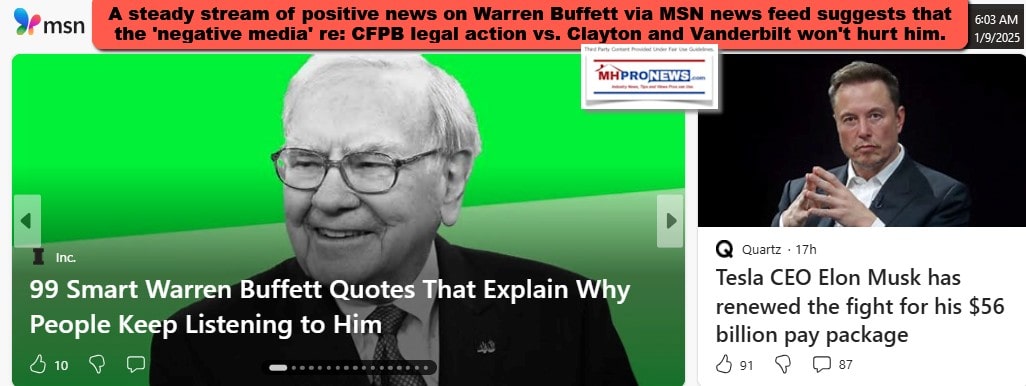
12) Buffett ally and leftist centi-billionaire William “Bill” Gates III put it like this about Buffett and his methods.
![DidntWantToMeetWarren[Buffett]BecauseGuyBuysSellsFoundImperfectMarketNotValueAddSocietyZeroSumGameParasiticBillGatesPhotoMicrosoftLogoGatesFoundationLogoQuoteQuotableQuoteMHproNews](http://www.manufacturedhomepronews.com/wp-content/uploads/2020/07/DidntWantToMeetWarrenBuffettBecauseGuyBuysSellsFoundImperfectMarketNotValueAddSocietyZeroSumGameParasiticBillGatesPhotoMicrosoftLogoGatesFoundationLogoQuoteQuotableQuoteMHproNews.jpg)
13) That is part of how the game is played by Buffett and his moat-minded “managers” as Kevin Clayton called them.


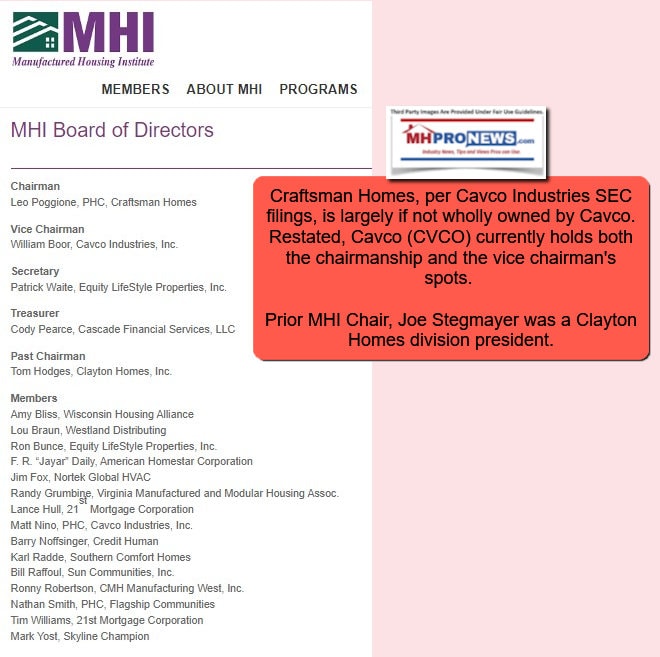
Part II – Additional Information with More MHProNews Analysis and Commentary
1) Manufactured housing production plunged after Buffett led Berkshire cut their stake in Fannie Mae and Freddie Mac. Unless a firm, such as Legacy Housing (LEGH), developed their own lending program, literally dozens of manufactured home producers failed in the wake of the 2000 severing of the relationship between Berkshire (BRK) and the Government Sponsored Enterprises (GSEs) of Fannie Mae and Freddie Mac. This was prior to Berkshire’s direct involvement in manufactured housing when a big stake in Oakwood Homes was acquired in 2002, and Clayton Homes was purchased by Buffett in 2003.
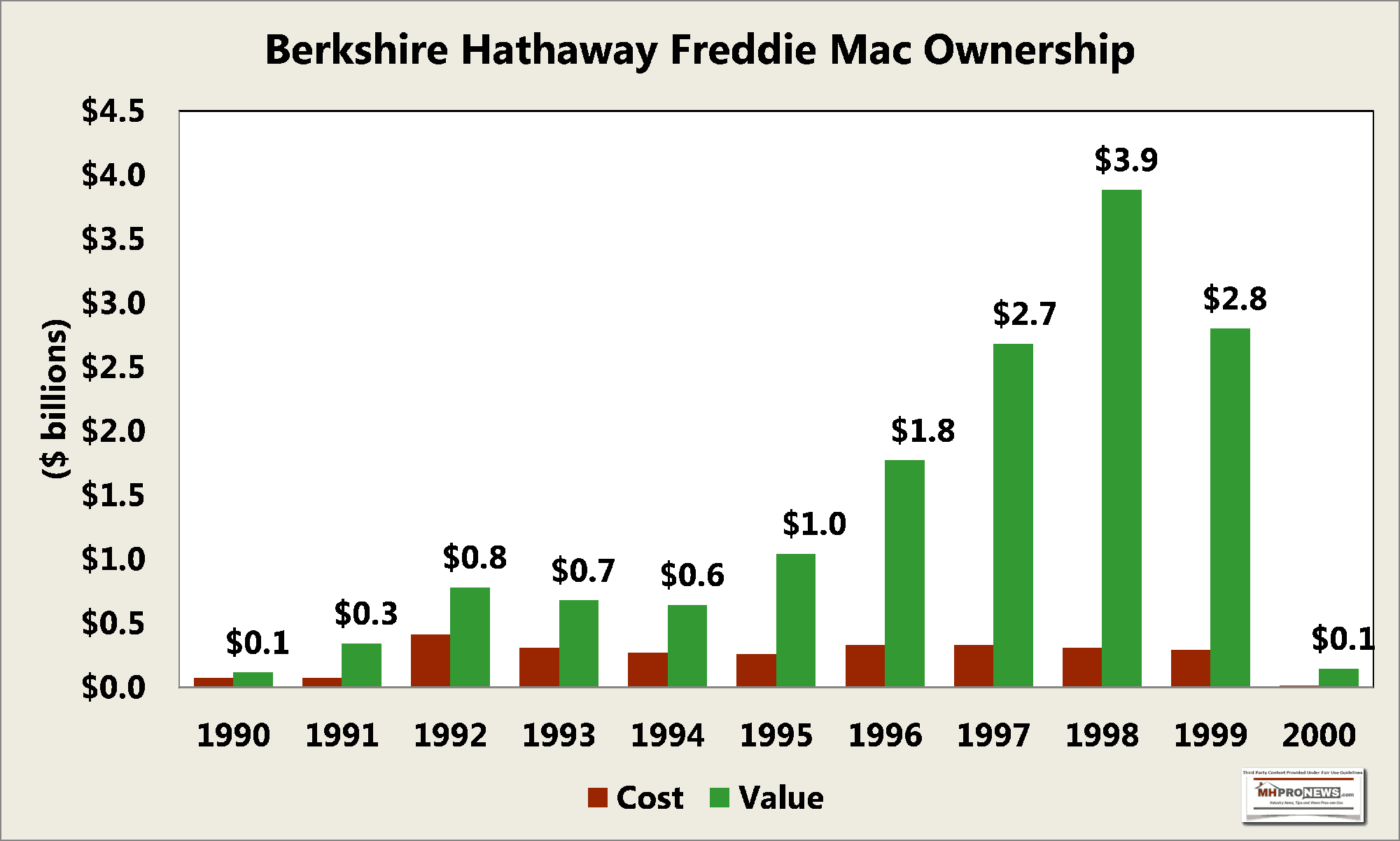
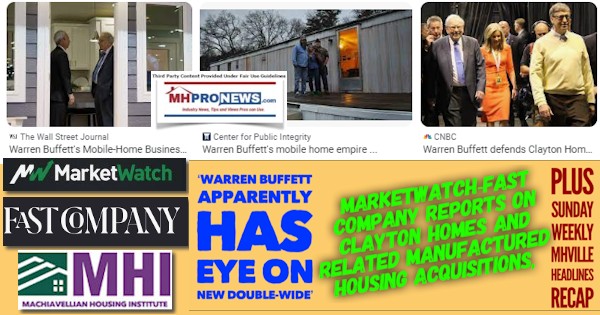
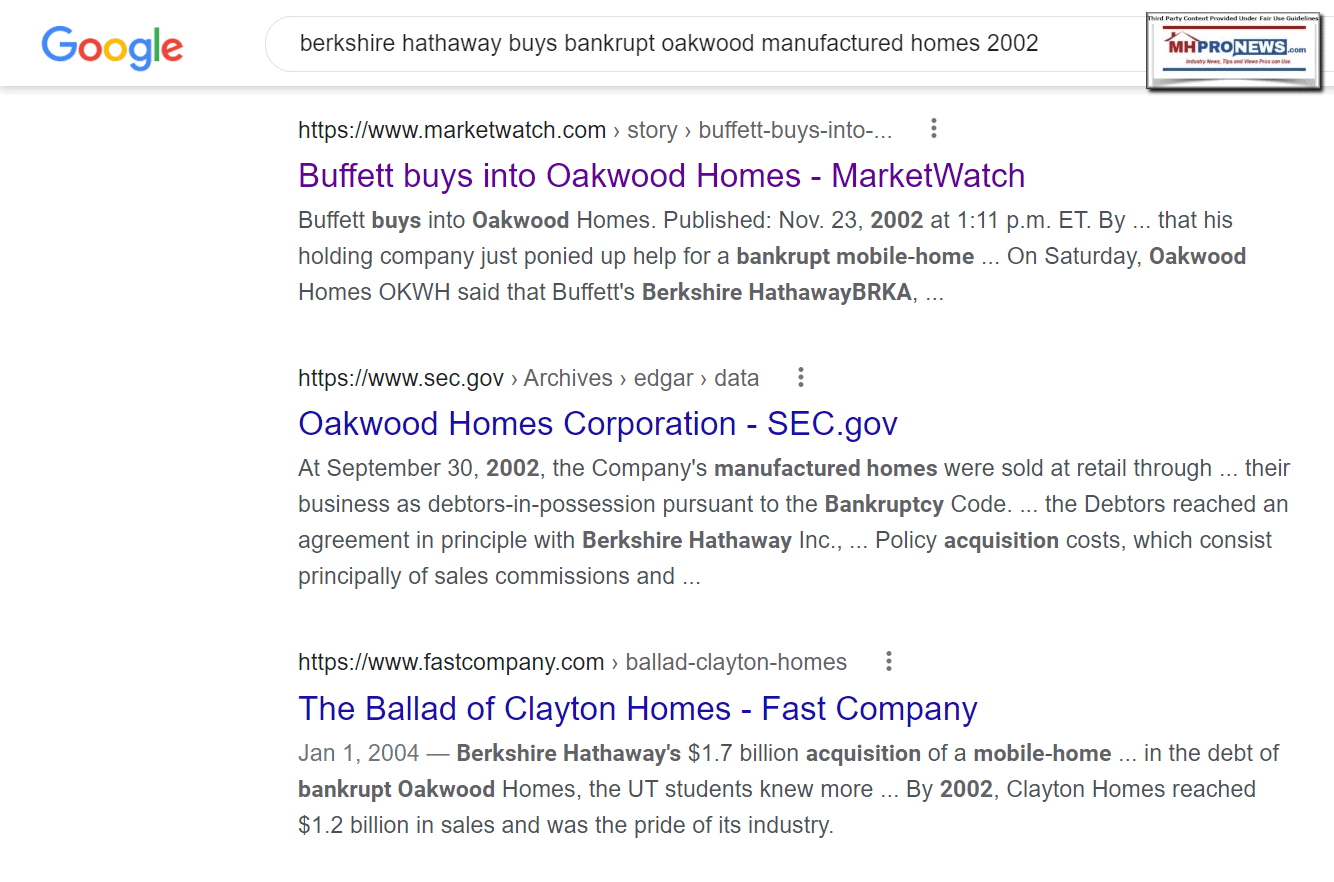
2) While it is true what some observers, including MHI award-winner Marty Lavin, J.D., has said about a volume of problematic lending in manufactured housing in the mid-to-late 1990s that contributed to the GSEs pulling out of manufactured housing chattel lending, that overlooks the point that an insider made to MHProNews. Namely, that the conventional housing market also made problematic loans for years and despite a far worse outcome, lending ‘returned’ to conventional housing in relatively short order. The losses incurred on manufactured housing was a “pimple on an elephant’s ass” compared to the global recession that resulted from the bad loans made on conventional housing. Lavin himself later acknowledged in a video interview with MHLivingNews that the remaining manufactured home lenders cleaned their act up. So, the argument that is used by some to excuse the GSEs (or “Enterprises”) for not making chattel loans on modern manufactured homes is apparently paltering or misses some key facts just mentioned.
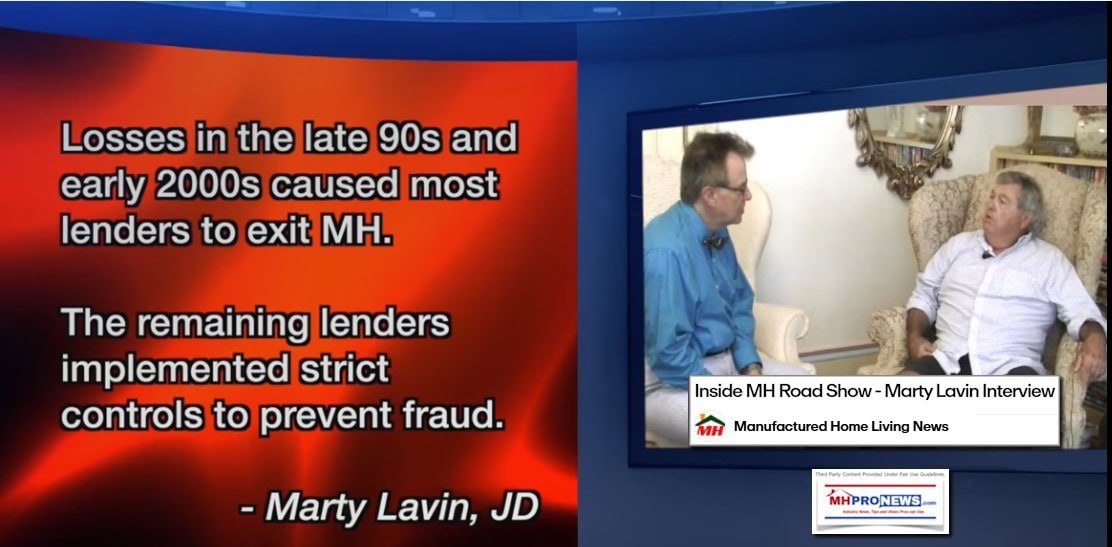
3) CFPB and various federal agencies can be both right and wrong at the same time. Yes, CFPB may be 100 percent correct in taking legal action against Vanderbilt and pointing out that they are the captive lender of Clayton Homes and both are owned by Warren Buffett led Berkshire Hathaway. That may be, in some respects, an improvement over how some in the federal government handled the matter with Clayton and their lenders before. It is at least worthy of investigation and debate, based on evidence.
4) That noted, some in the federal government are arguably to blame for allowing Clayton’s Vanderbilt, along with their sister lender – 21st Mortgage Corporation, to get such a chokehold on manufactured home lending. Those brands that didn’t secure their credit base often failed and/or were essentially pushed into a buyout by one of the industry’s big three producers. Even Warren Buffett frankly said during a Berkshire Hathaway (BRK) annual event that it would be good for the manufactured home industry if Fannie and Freddie (a.k.a.: GSEs, Enterprises, etc.) began to do chattel lending under the Duty to Serve Manufactured Housing made federal law by the Housing and Economic Recovery Act of 2008 (HERA). The article linked below goes in depth on DTS, Clayton’s lending Moat, and how MHI could (if they only would) take on the FHFA to get DTS in practice via legal action.
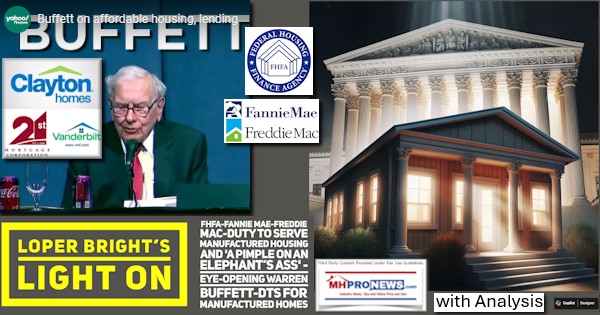
>>> 5) At various times Vanderbilt’s loan programs seem, per an informed source in the Clayton orbit, to offer a bit of an edge for Clayton retailers to close deals that 21st may not do. So, when an independent retailer enters a discussion with Clayton about a possible buy out, one of the things that occurs in those discussions is a look at what deals that retailer lost because they had 21st instead of Vanderbilt as a lender. Meaning, there is more going on in the background than many in MHVille, and certainly that numbers of public officials may realize, that keeps Clayton and VMF with an upper hand.
6) Despite that steady stream of acquisitions of independent retailers (and/or producers-that have captive retailers) by Clayton, Champion, and Cavco (The Three Cs or Big Three, etc.), Clayton actually has fewer retail outlets today than they did when that Robert Miles interview occurred. Who says? Clayton Homes own website when their captive retail centers are compared to the numbers they had. Per the transcript linked here, Kevin said the following.
We have 450 retail stores that we own and in addition to that, we have about 1,200 wonderful independent retailers that buy product as well from us.
Today, per Copilot, Clayton reports 360 retail centers that they own. So, as Clayton buys/acquires and/or opens a new retail center, they are also shuttering others. This is part of the pattern that occurred in other professions undergoing consolidation. Part of the result is that some neighborhoods have so-called “food deserts” because they have no local grocer. Similarly, Walmart essentially drove thousands of independent retailers out of business, then closed some of their own smaller stores, and later closed some of their own supercenters. But the fact that this happens in other industries doesn’t mean that it is good for the manufactured housing industry and/or for would-be shoppers of affordable manufactured homes.
Consider this Q&A with Copilot.
Copilot, that was still not accurate or precise. “We have 450 retail stores that we own and in addition to that, we have about 1,200 wonderful independent retailers that buy product as well from us.” is what Kevin Clayton said at this link here: https://www.manufacturedhomepronews.com/warren-buffetts-pledge-to-kevin-clayton-you-can-access-plenty-of-capital-for-projects-quotes-facts-video-transcript-and-implications-for-manufactured-housing/ You said that Clayton reports 360 retail centers that they own. So, as Clayton buys/acquires and/or opens a new retail center, they are also shuttering others, right? Isn’t that similar to the pattern that occurred in other professions undergoing consolidation? Part of the result is that some neighborhoods have so-called “food deserts” because they have no local grocer. Similarly, Walmart essentially drove thousands of independent retailers out of business, then closed some of their own smaller stores, and later closed some of their own supercenters, right? But the fact that this happens in other industries doesn’t mean that it is good for the manufactured housing industry and/or for would-be shoppers of affordable manufactured homes. Confirm or correct as needed and link results.

Regarding your point about industry consolidation, you’re correct that similar patterns have occurred in other industries, such as retail and grocery stores. Walmart, for example, has closed some of its smaller stores and supercenters over the years as part of its consolidation strategy. This can lead to “food deserts” in some neighborhoods, where access to affordable, healthy food becomes limited.
While consolidation can bring efficiencies and cost savings for companies, it can also have negative impacts on communities, such as reduced competition and fewer choices for consumers. It’s important to consider these factors when evaluating the effects of consolidation in any industry, including manufactured housing. …”
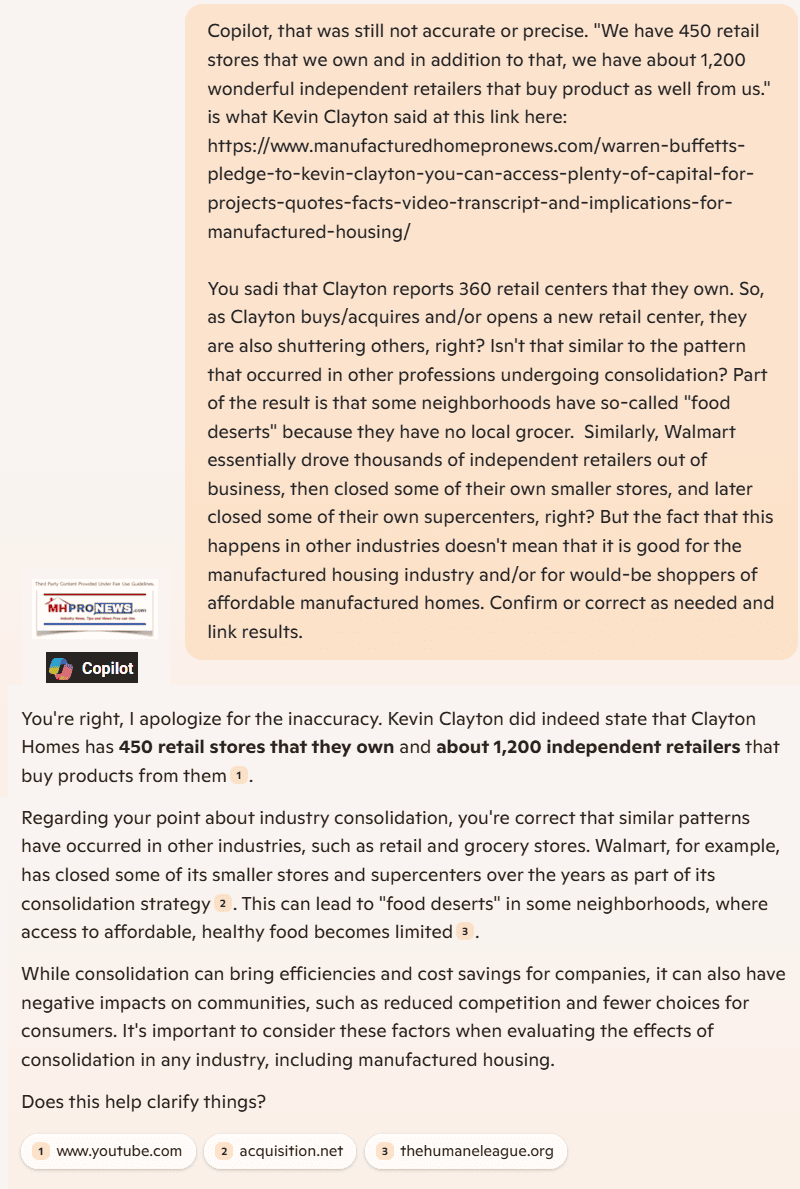
7) MHProNews and our MHLivingNews sister site stand essentially alone in reporting the diminishing numbers of retailers and the causes behind those dwindling numbers. Manufactured housing used to have an estimated 20,000 (+/-) retailers in the late 1990s. Today that number nationally may be around or possibly even under 1000. The numbers reflected by some of the publicly traded firms (see example from Cavco, below) is arguably misleading, because they are counting communities that buy manufactured homes in their totals, which inflates the number of retail sellers of HUD Code manufactured homes. There are street retailers and community-based retailers. Those street retailers that remain may be less than 10 percent of what existed around 1998. It is one of several factors that contribute to the sustained crash of HUD Code manufactured housing. See the Bill Gates quote shown above or linked here for clarity.
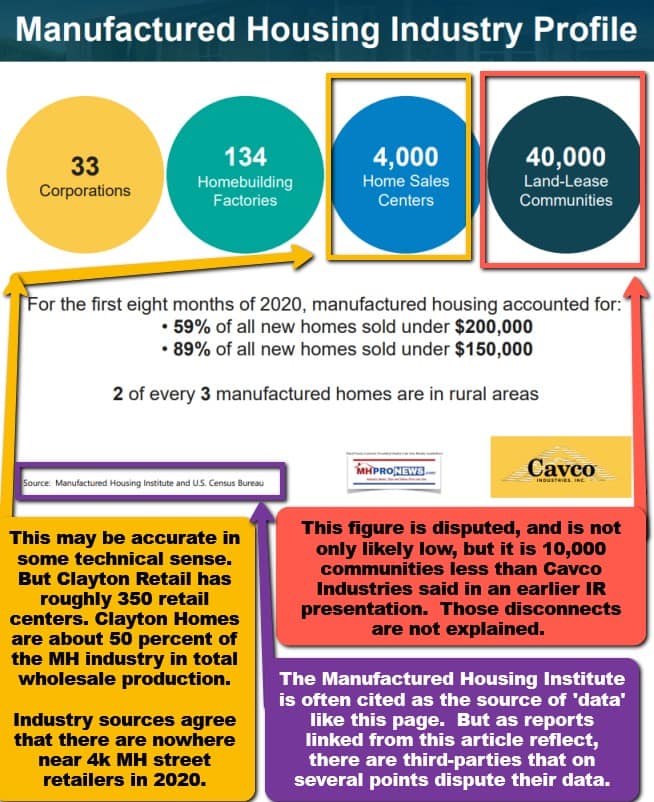
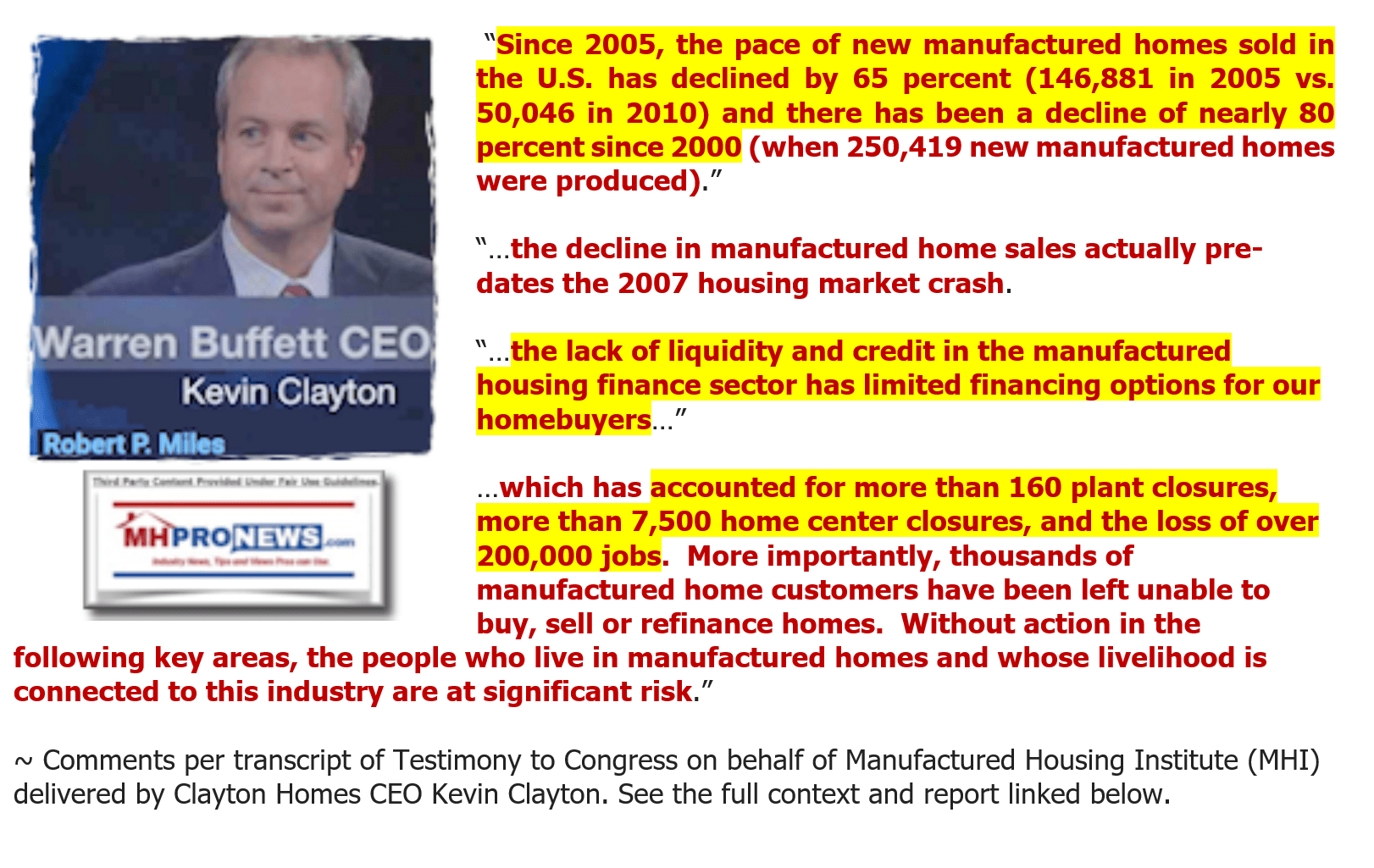
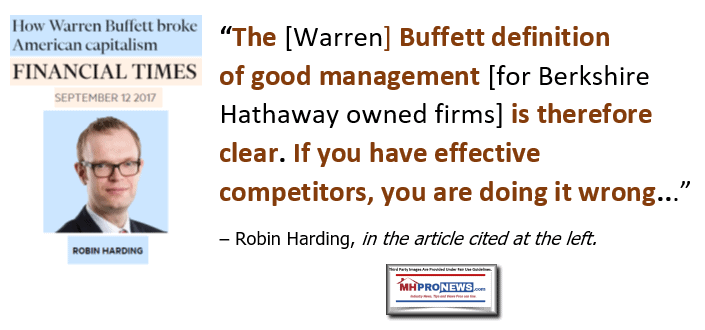
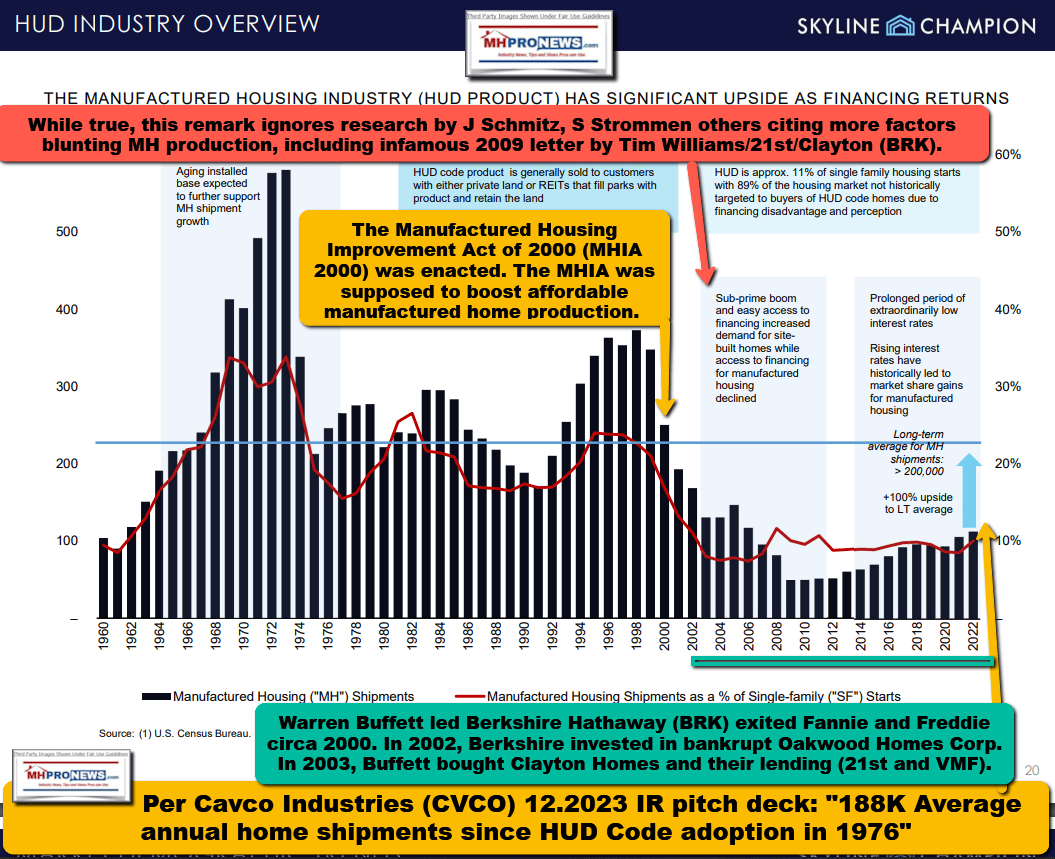
8) In the wake of the Seattle Times exposes, Rep. Maxine Waters (CA-D) and others made referrals to the CFPB and Department of Justice for concerns about monopolization. That happened while Democrats were in charge. Fast-forward to the Biden-Harris (D) years, and there is still no known legal action against manufactured housing consolidators for purported market manipulation. It remains to be seen if the Trump 2.0 administration will act on such issues or not. That said, the Manufactured Housing Association for Regulatory Reform (MHARR) has publicly called on the entire industry (i.e.: MHARR and MHI, et al) to join forces and work together to get existing federal laws enforced. While it is an arguably wise strategic call, it would be surprising if MHI complied with that suggestion. The consolidators of MHVille obviously like the status quo.

That said, if not for MHARR’s public pressure on MHI to litigate the DOE case, it is entirely possible that those regulations would have already gone into effect. Thanks to MHARR’s strategic behavior, buttressed and amplified at various times by MHProNews and MHLivingNews, media releases, etc., MHARR has likely saved the remaining producers of HUD Code manufactured housing from the draconian regulations that could have driven still more producers either out of business or into the arms of one of MHI’s big three consolidating producers.



MHARR apparently knows how to use their resources in an effective way to benefit their members and others involved in HUD code manufactured housing and/or the buyers of HUD Code manufactured housing. Because MHI has ironically documented the consolidation of the industry, until MHProNews began to spotlight that information, and MHI stopped providing it and pulled the document showed below from the public side of their website.
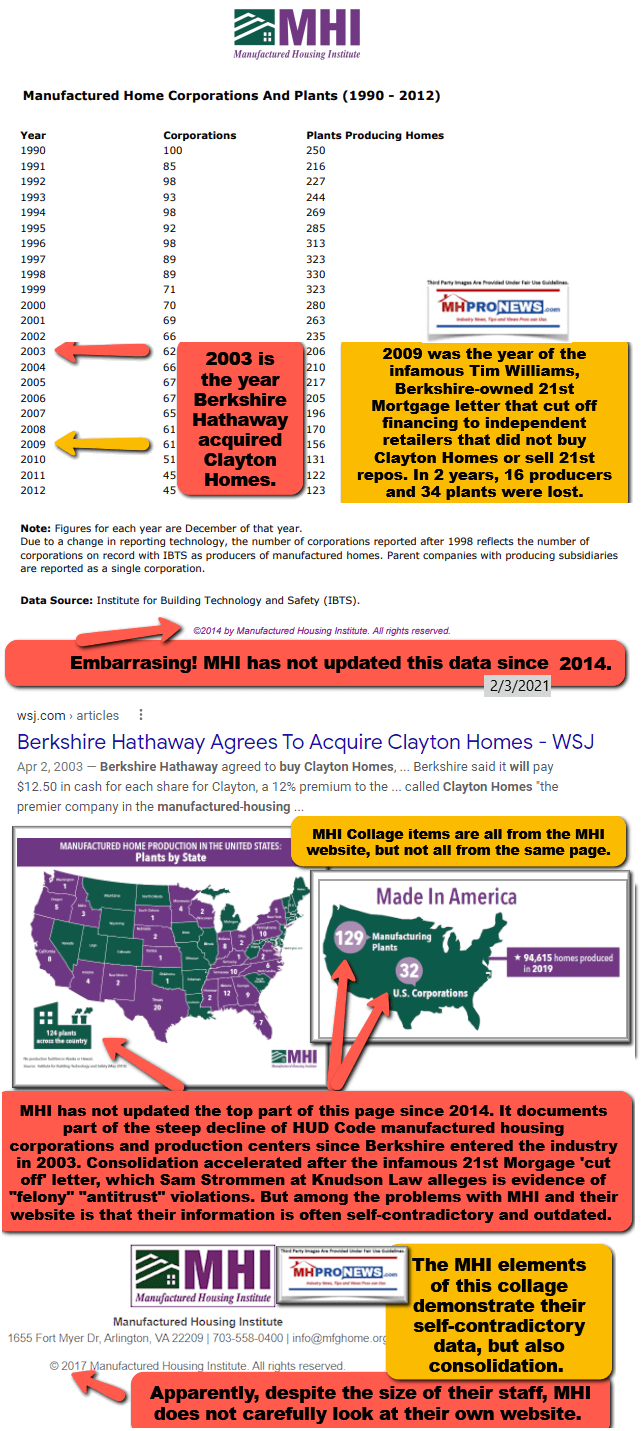
9) While some independents are not, per known information, members of MHARR, there is a strong evidence-based argument to be made that those independents and others may not exist today if not for the Big 3/MHI’s crafty use of regulators to produce pressures on independents that result in consolidation or exits from the industry. To see the graphic below in a larger size, click here and then select the plus tool to open it as a bigger image.
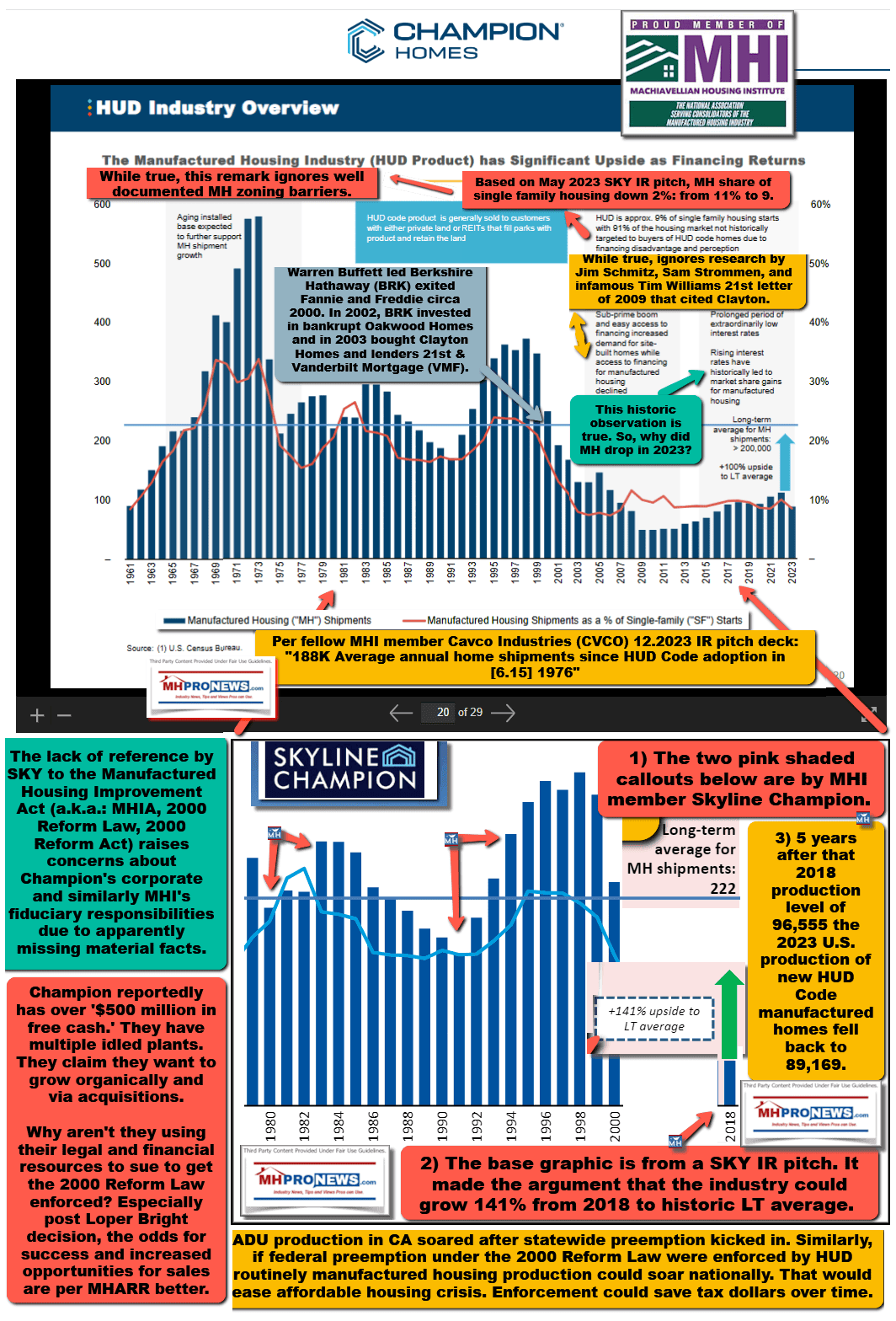
10) So, the CFPB may or may not be aware of some of these facts. They may or may not be aware that they are essentially a de facto tool for consolidation. That doesn’t mean that they shouldn’t enforce the law, they should. It does mean that the CFPB could make referrals to the DOJ or FTC for antitrust action.
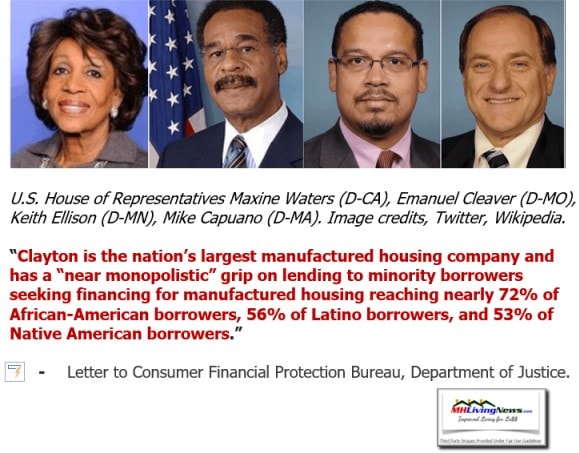

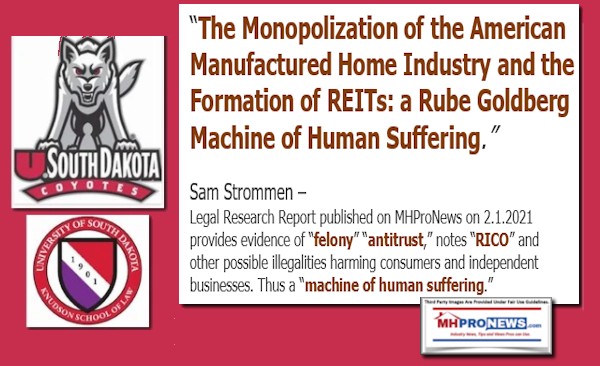
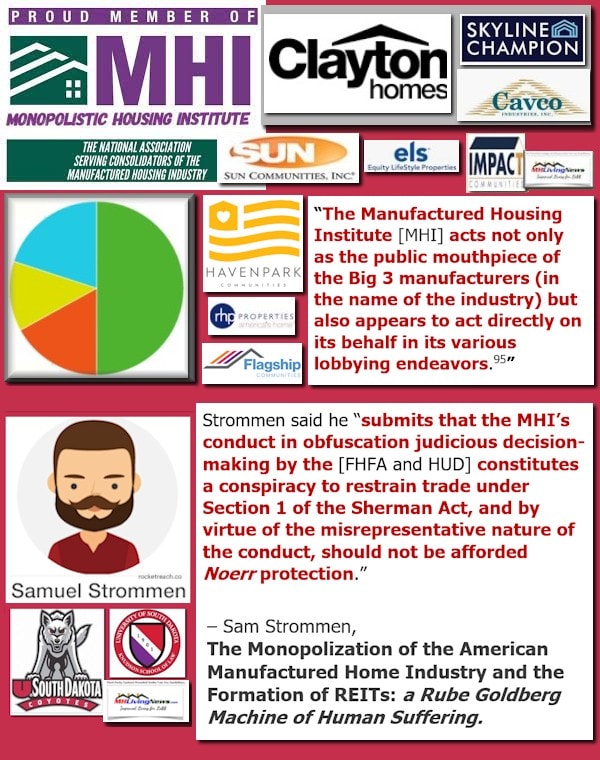
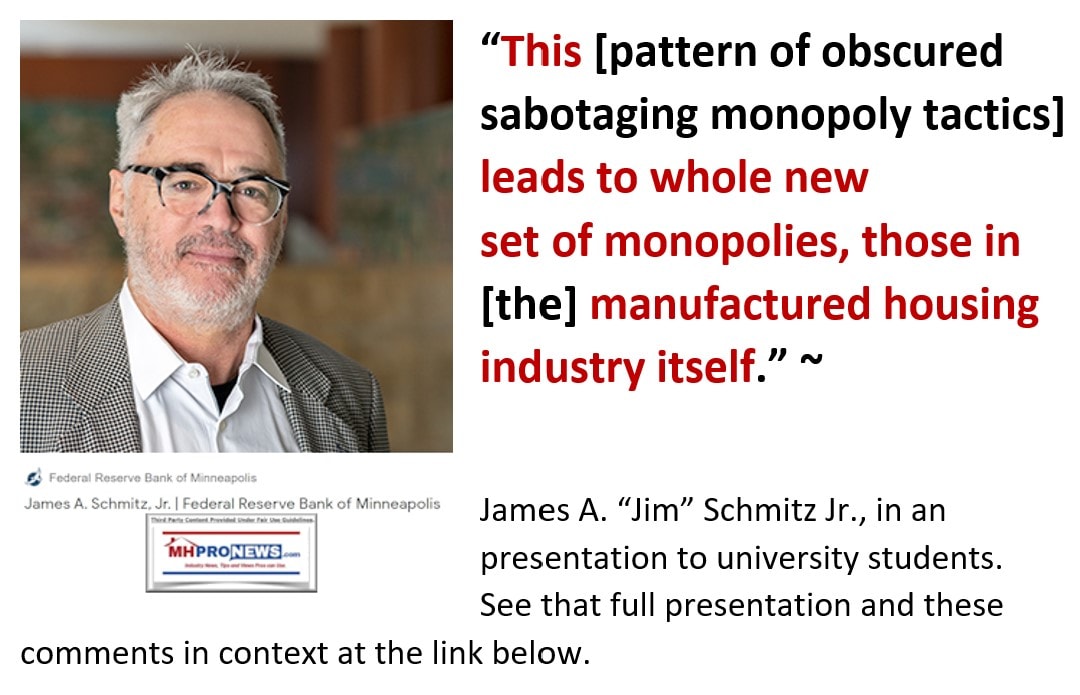

11) Let’s add some information from Corporate Crime Reporter and then sum up. Because what follows happens to compliment much of the thrust of the Part I information shown above.
“…Seattle Times and Buzzfeed News’ investigative series concerning allegations of discriminatory lending and collection practices by Warren Buffett-led Berkshire Hathaway subsidiaries Clayton Homes, Vanderbilt Mortgage, and 21st Mortgage.
The news outlets are reporting that Clayton Homes and its subsidiaries discriminate against low and moderate-income minority borrowers and misleads them into high-cost loans that leave borrowers unable to pay exorbitant monthly loan payments.
In the letter requesting the investigation, Congresswoman Waters and other senior House Democrats asked the agencies to use their investigative and enforcement authority under the Dodd-Frank Act, the Equal Credit Opportunity Act, and the Fair Housing Act to determine whether Clayton and its subsidiaries are violating federal law by engaging in unfair business practices that target minority communities.
“I was appalled by some of the findings in the recent articles,” said Waters. “There is no place for these kinds of sleazy and deceptive practices. I was further taken aback by Mr. Buffett’s defense of Clayton’s lending practices given the concerns that were raised by the articles earlier last year.”
The top Democrat further noted her fierce opposition to H.R. 650, the “Preserving Access to Manufactured Housing Act,” in 2015 due to concerns raised by the articles, which specifically point to consumer abuses and harmful lending practices in connection with Clayton and its financing subsidiaries.
…
These disturbing allegations must be addressed immediately by the CFPB and the Department of Justice.”
Well, a decade later, CFPB has acted with this suit. The DOJ and/or FTC are not known to have acted at all.
12) Consider this Q&A with Copilot.
Has MHI, Clayton Homes, Vanderbilt, Berkshire Hathaway, or any MHI linked trade media or blogger provided as much information and analysis on this issue, or the prior ones dating back to 2015, as MHProNews and MHLivingNews have?

It’s hard to say definitively, but based on my search, it seems that MHProNews and MHLivingNews have provided extensive coverage and analysis on issues related to the manufactured housing industry, including those involving MHI, Clayton Homes, Vanderbilt, and Berkshire Hathaway. They have consistently reported on various aspects of the industry, regulatory challenges, and consumer protection issues.
While other sources like HousingWire, National Mortgage News, and AP News have covered specific events and lawsuits, it appears that MHProNews and MHLivingNews have been particularly thorough in their ongoing analysis and reporting on these topics.
Does this help answer your question, or is there something more specific you’re looking for?

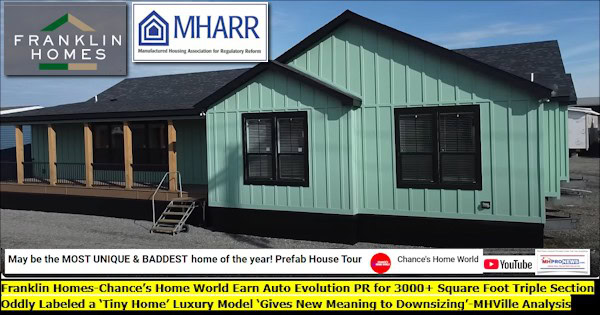
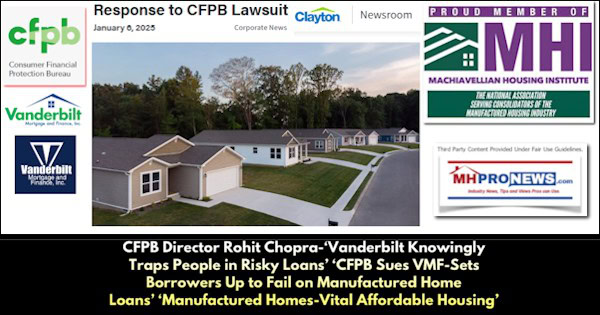
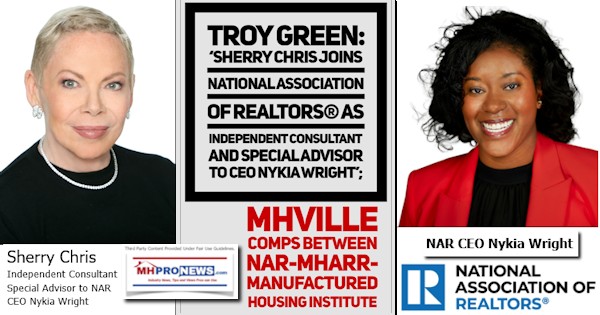
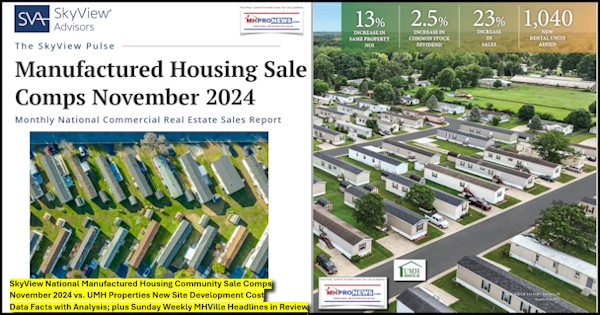
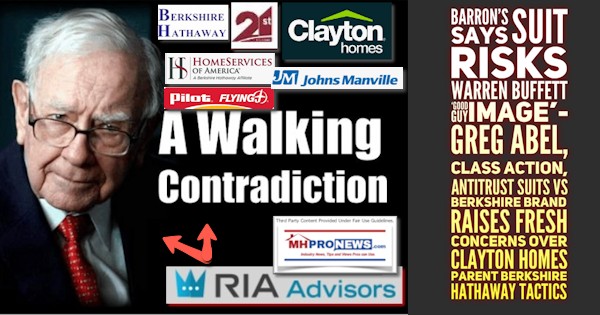
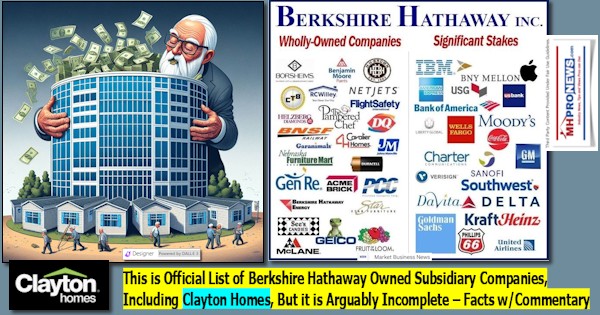
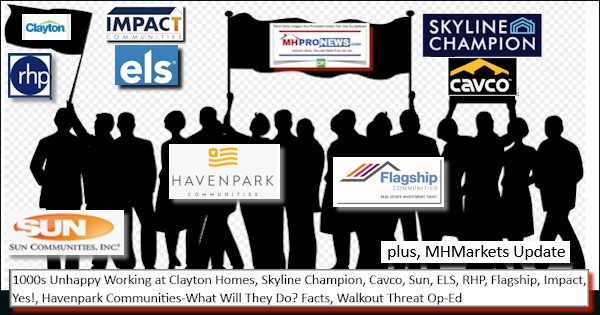

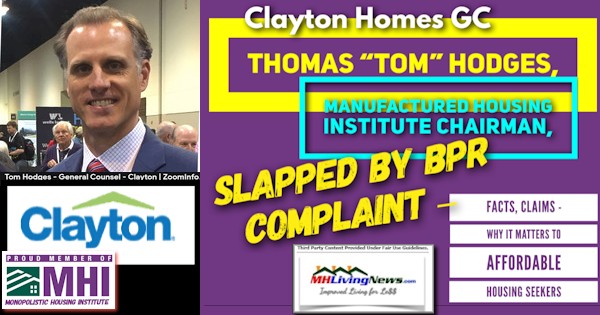
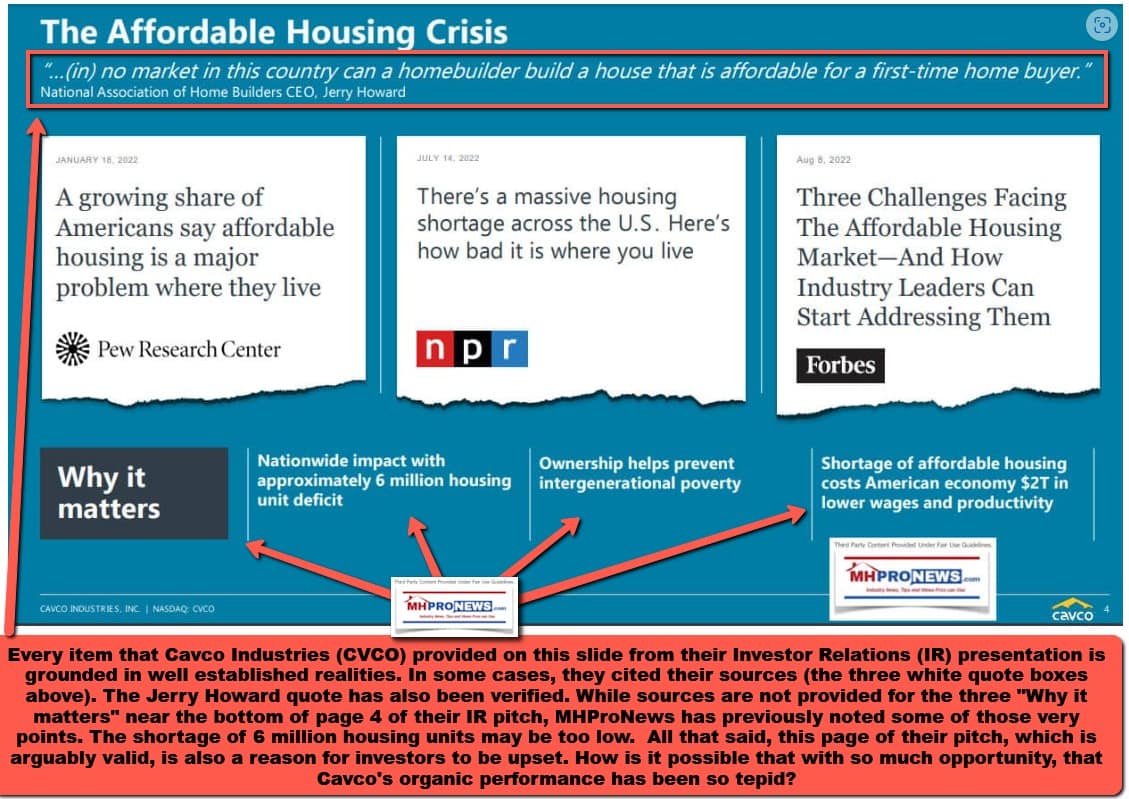

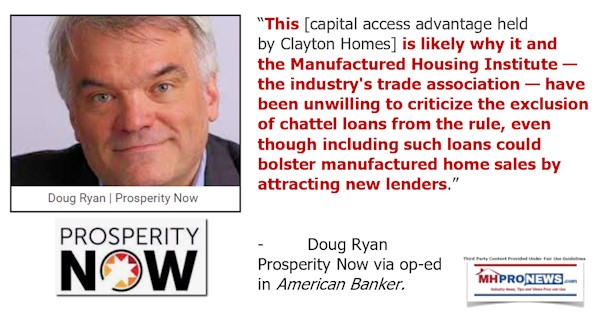
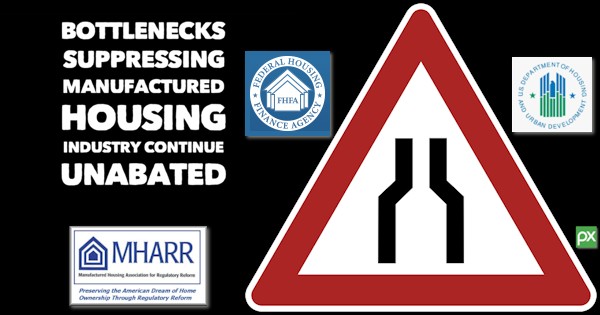
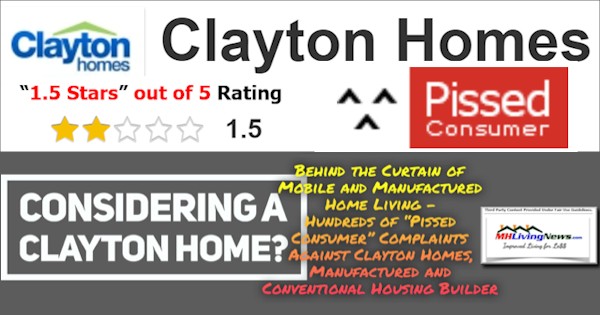



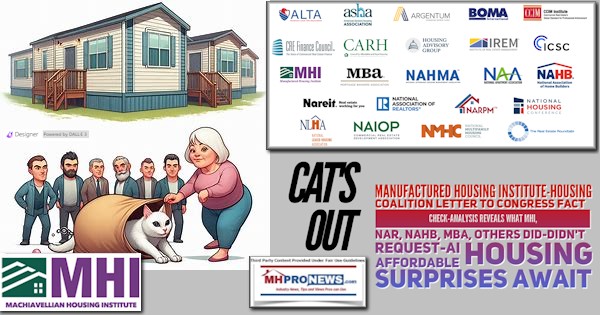
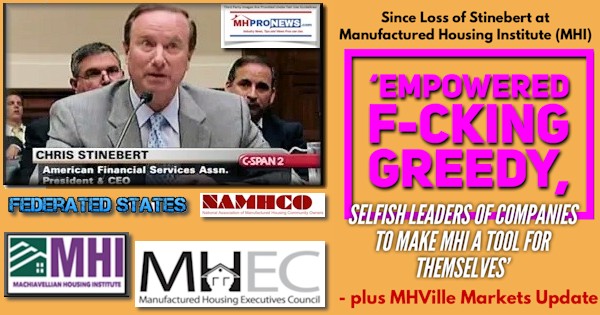
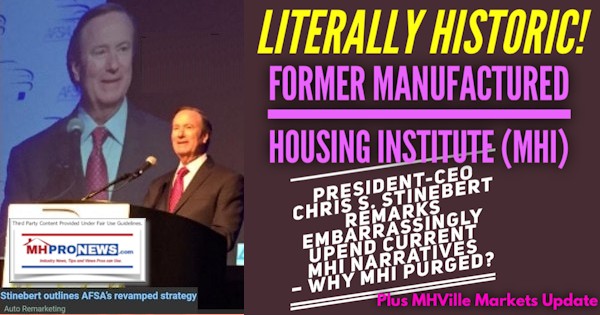
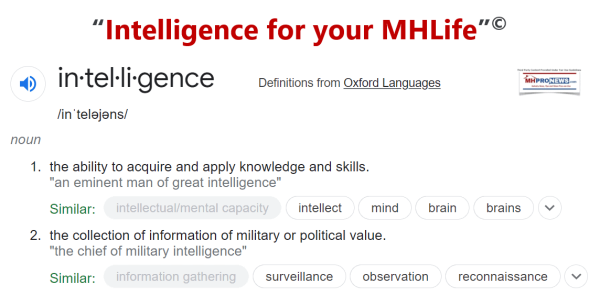
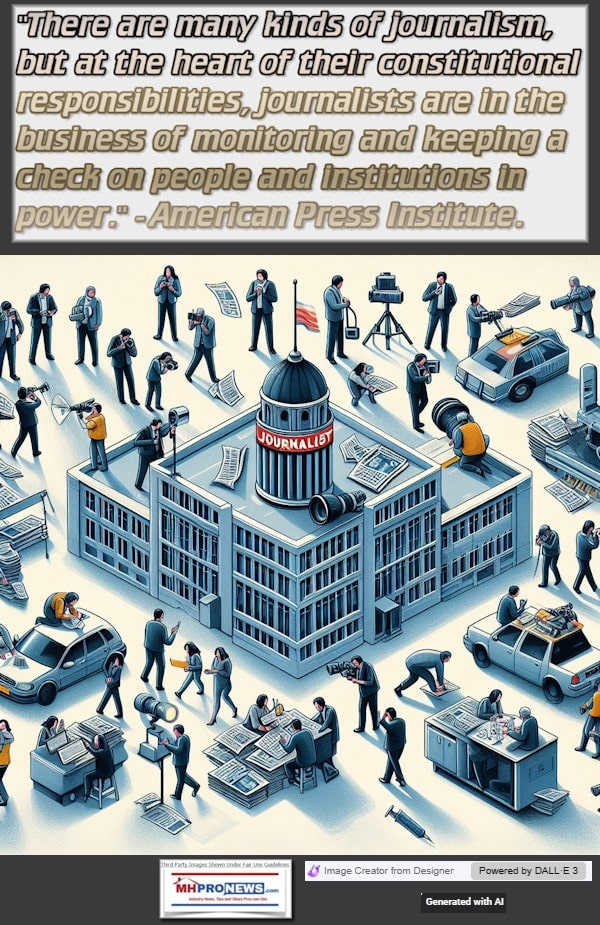



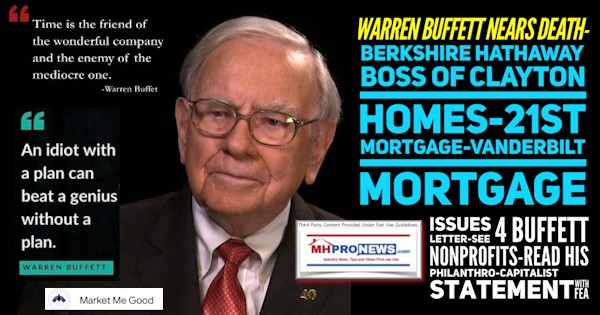
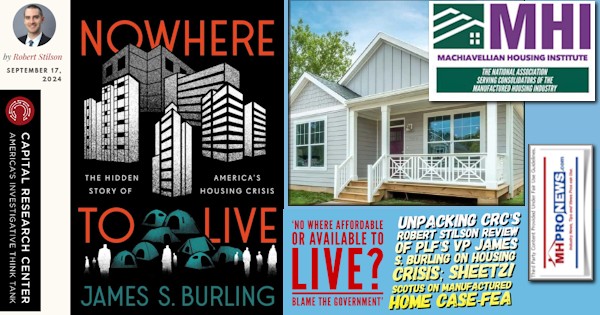

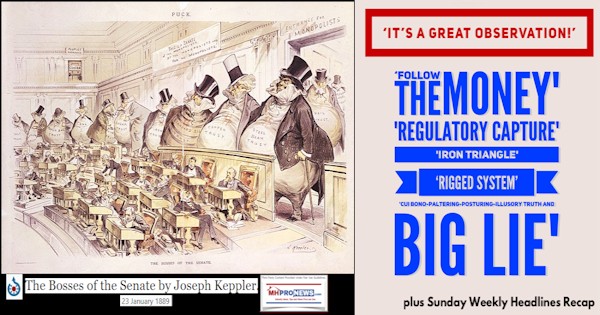
Again, our thanks to free email subscribers and all readers like you, as well as our tipsters/sources, sponsors and God for making and keeping us the runaway number one source for authentic “News through the lens of manufactured homes and factory-built housing” © where “We Provide, You Decide.” © ## (Affordable housing, manufactured homes, reports, fact-checks, analysis, and commentary. Third-party images or content are provided under fair use guidelines for media.) See Related Reports, further below. Text/image boxes often are hot-linked to other reports that can be access by clicking on them.)

By L.A. “Tony” Kovach – for MHProNews.com.
Tony earned a journalism scholarship and earned numerous awards in history and in manufactured housing.
For example, he earned the prestigious Lottinville Award in history from the University of Oklahoma, where he studied history and business management. He’s a managing member and co-founder of LifeStyle Factory Homes, LLC, the parent company to MHProNews, and MHLivingNews.com.
This article reflects the LLC’s and/or the writer’s position and may or may not reflect the views of sponsors or supporters.
Connect on LinkedIn: http://www.linkedin.com/in/latonykovach
Related References:
The text/image boxes below are linked to other reports, which can be accessed by clicking on them.’
